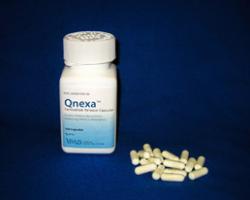 If, at first, you don’t succeed try, try again. That’s what Vivus, the makers of a diet drug called Qnexa did by resubmitting their drug approval application to the FDA advisory committee and it is now one step closer to being approved. The initial application was rejected because of two main concerns: risk of cardiac events like heart attacks and risk to women of child bearing age and women who may be pregnant.
If, at first, you don’t succeed try, try again. That’s what Vivus, the makers of a diet drug called Qnexa did by resubmitting their drug approval application to the FDA advisory committee and it is now one step closer to being approved. The initial application was rejected because of two main concerns: risk of cardiac events like heart attacks and risk to women of child bearing age and women who may be pregnant.
Qnexa is a combination drug of phentermine and topiramate. Both these drugs are currently available by prescription which makes the approval process a little bit easier for Qnexa because there already are a lot of clinical trials and data available about these drugs. Phetermine increases metabolism while topiramate is used for seizures, migraine prevention and as an adjunct therapy for conditions like bipolar disorder. Weight loss for topiramate is really more of a glorified side effect that is believed to be caused by an increase in energy for the patient and increased feeling of fullness after eating because the digestive tract is slowed down.
Qnexa is a capsule made up of immediate release phentermine and extended release topiramate which would have a longer duration of action and is taken once daily. Vivus is currently studying the use of a low, moderate and high dose combination. Qnexa is indicated for people who have a BMI of 30 or higher or overweight patients with a BMI greater than 27 who have other conditions like hypertension, type 2 diabetes, high cholesterol, and fat that is most prominent on the abdomen also known as belly fat. The most common side effects of this combination drug include a prickling or tingling sensation, dry mouth, constipation, and headache.
The first time the Qnexa’s application was submitted to the FDA was February 28th of 2026. The FDA issued a letter to the company Vivus stating their two main concerns before they would agree to approve the drug. They were concerned about the side effect of increase heart rate and wanted to make sure this side effect did not increase the risk of heart attack or other heart issues like arrythmias. Vivus resubmitted their application on October 17th, 2026.
Now, for ladies, there was a huge hiccup and Vivus was willing to lose a huge market of patients because of it. When they resubmitted their application I think they believed this was the only way they could get their drug approved. Vivus decided to make Qnexa contraindicated in women of child bearing age. So this means anyone who is still having periods and not gone into menopause would not have the option of this being prescribed to them by their doctor. There are two reasons why the makers did this. First is because there are huge risks to a fetus if a women is pregnant while taking this. Secondly, topiramate interacts with birth control making them less effective so the chance of an unplanned pregnancy are much higher. This is a huge counseling point for pharmacists who see patients on both of these medications. Many women are taking topiramate for migraine prevention and migraines can be triggered by hormone fluctuations during a women’s monthly cycle. Doctor and pharmacists should advise their patients to use a back-up method like condoms to prevent pregnancy while on topiramate and a birth control.
The FDA advisory committee felt that restriction should be revised to a warning that women who are pregnant are advised not to take the medication and to stop it if they became pregnant. It is the physician’s and pharmacist’s job to educate their patients about the risk associated with Qnexa.
So let’s talk about the weight loss results that are being seen. The 3 phases of trials that were conducted included over 5,000 patients and many of the patients were treated with the drug for six months to a year. Typically phentermine is indicated for 12 weeks of therapy so seeing how long patients were on the combination drug does concern me. Patients lost on average about ten percent of their body weight in a year but gained a small amount back in year two of the trial. Most patients saw their big weight loss numbers in the first four weeks and saw more gradual progress as the year trial went on.
The advisory committee to the FDA voted 20 to 2 to approved Qnexa. We will know Qnexa’s fate by April 17th when the FDA will make their final decision.
